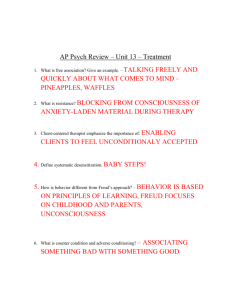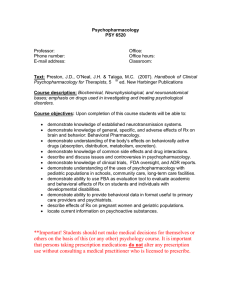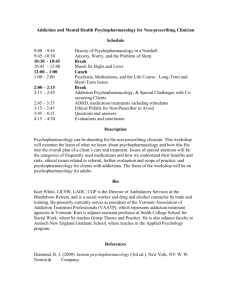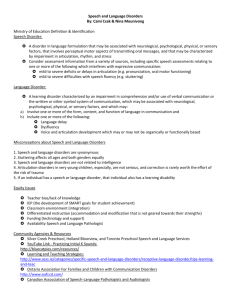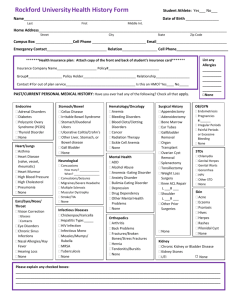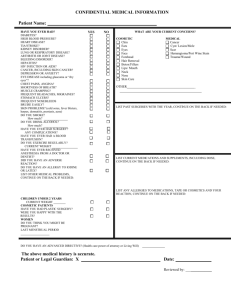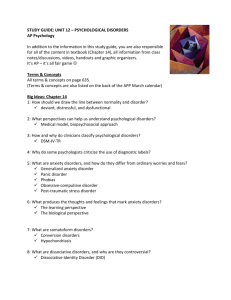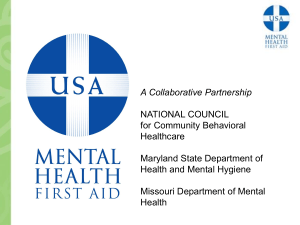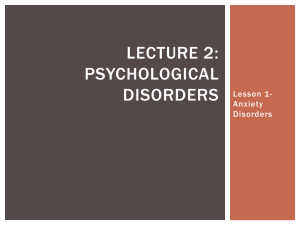course description - Universidad del Turabo
advertisement
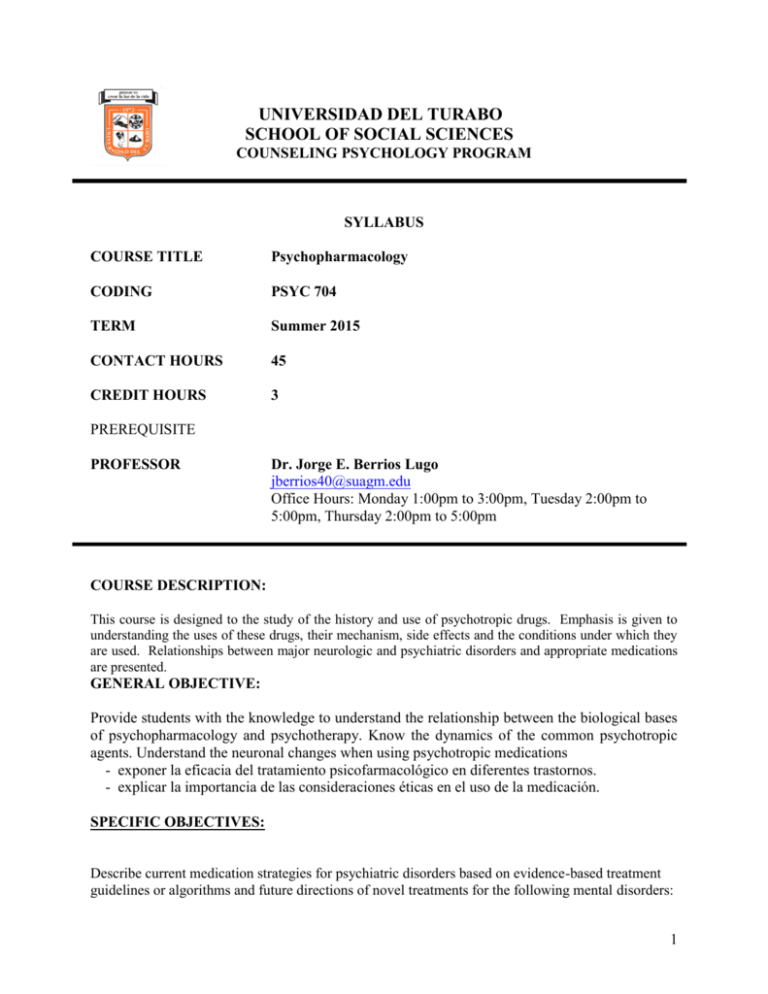
UNIVERSIDAD DEL TURABO SCHOOL OF SOCIAL SCIENCES COUNSELING PSYCHOLOGY PROGRAM SYLLABUS COURSE TITLE Psychopharmacology CODING PSYC 704 TERM Summer 2015 CONTACT HOURS 45 CREDIT HOURS 3 PREREQUISITE PROFESSOR Dr. Jorge E. Berrios Lugo jberrios40@suagm.edu Office Hours: Monday 1:00pm to 3:00pm, Tuesday 2:00pm to 5:00pm, Thursday 2:00pm to 5:00pm COURSE DESCRIPTION: This course is designed to the study of the history and use of psychotropic drugs. Emphasis is given to understanding the uses of these drugs, their mechanism, side effects and the conditions under which they are used. Relationships between major neurologic and psychiatric disorders and appropriate medications are presented. GENERAL OBJECTIVE: Provide students with the knowledge to understand the relationship between the biological bases of psychopharmacology and psychotherapy. Know the dynamics of the common psychotropic agents. Understand the neuronal changes when using psychotropic medications - exponer la eficacia del tratamiento psicofarmacológico en diferentes trastornos. - explicar la importancia de las consideraciones éticas en el uso de la medicación. SPECIFIC OBJECTIVES: Describe current medication strategies for psychiatric disorders based on evidence-based treatment guidelines or algorithms and future directions of novel treatments for the following mental disorders: 1 a. Major depressive disorder b. Bipolar disorder c. Anxiety disorders i. Generalized anxiety disorder ii. Social anxiety disorder iii. Post-traumatic stress disorder iv. Panic disorder d. Insomnia e. Attention Deficit/Hyperactivity Disorder f. Dementias g. Substance use disorders 7. Recognize warnings, precautions, and appropriate referrals for medical interventions for side effects as they relate to the use of psychotropic medications. REQUIREMENTS AND NORMS: Attendance and participation in class discussions is required since class group discussion enhances the integration of theory with professional experiences. Excused absence is defined as an absence that involves an illness of self or close relative, events of nature, or life threatening situations. These must be justified in an affirmative manner through official documents. Readings of the assigned material are necessary and compulsory. Assignments: Must be handed on time to the professor according to the previously established date. Five (5) points deduction will be made from the final grade (of each assignment) for each day of delay. Plagiarism: using someone else’s ideas, words, phrases, etc., without proper acknowledgement is considered a violation of the APA Ethical Code and UT norms. Disability Statement: Students with documented disabilities who may need classroom special accommodation should make an appointment with the Quality and Student Welfare Office for proper certification. Syllabus Modification: The professor reserves the right to modify, delete, or add any requirements on this syllabus for reasonable cause. Such modifications must be informed to the students and in no way may increase the required standard of evaluation. COURSE CONTENT Unit 1 Objectives: Upon completion of this unit, students will be able to: 1. Define psychopharmacology 2. Discuss the basic concepts of neuranatomy, neuroceptors and neurotransmitters. 3. Define pharmacokinetics Introduction, Historical Perspective, Integrated Models 2 Neurobiolgy Pharmacology Assigned Readings (Chapters 1 to 4) Unit 2 Upon successful completion of units students will be able to: 1. Explain the psychoactive drug effect in human behavior and nonadherence effects 2. Discuss the history of the use of psychoactive drugs 3. Understand major Psychological Clinical Syndromes from a psychopharmacology perspective: Their etiology, diagnosis and clinical implications Treatment and Diagnostic Consideration (Chapter 5 & 6) Depressive Disorders (Chapter 7 & 16) Bipolar Disorders (Chapter 8 & 17) Unit 3 Upon completing this unit in a successful manner, students will be able to: Understand major Psychological Clinical Syndromes from a psychopharmacology perspective: Their etiology, diagnosis and clinical implications Anxiety Disorders (Chapter 9) Obsessive Compulsive Disorder (Chapter 10) PTSD (Chapter 12) Anti-anxiety Medications (Chapter 18) Unit 4 Upon completing this unit in a successful manner, students will be able to: Understand major Psychological Clinical Syndromes from a psychopharmacology perspective: Their etiology, diagnosis and clinical implications Mid Term Dementia (Assigned Readings not in Textbook) Unit 5 Upon completing this unit in a successful manner, students will be able to: Understand major Psychological Clinical Syndromes from a psychopharmacology perspective: Their etiology, diagnosis and clinical implications Psychotic Disorder (Chapter 11 & 19) Borderline Personality Disorder (Chapter 13) Substance Related Disorder (Chapter 14) Unit 6 Other Miscellaneous Disorders (Chapter 15) Child and Adolescent Psychopharmacology (Chapter23) Unit 7 OTC, Dietary Supplements and Herbal Products (Chapter 20) Medication Discontinuation (Chapter 21) 3 Red Flags: when to reevaluate (Chapter 22) Unit 8 Final Exam TEACHING STRATEGIES AND ACTIVITIES Lecture Class discussions Analysis of cases RESOURCES Audiovisual media Videos Library database Virtual Classroom (http://psicberrios.edu20.org) STUDENT’S EVALUATION CRITERIA AND GRADING SYSTEM: Student Evaluation Mid Term Test (100 points) Final Test (100 points) Daily Quizzes (100 points) Minimum Passing Grade: B TEXTBOOK Preston, J., O’neal, J. &, Talaga, M. (2013) Handbook of Clinical Psychopharmacology for Therapist, Seven Edition. New Harinber Publications; Oakland Assigned Readings BIBLIOGRAPHY Belle, D. & Singh, H.. (2008). Genetic factors in drug metabolism. American Family Physician, 77, 1553-1560. Cates, M., & Sims, P. (2005). Therapeutic Drug Management of Lithium. American Journal of Pharmaceutical Education, 69, 1-5. Maier, S.F., Watkins, L.R. and Fleshner, M. (1994). Psychoneuroimmunology. American Psychologist, 49 (12), 1004-1017. Mitchell, A. J., (2009) Do antipsychotic cost lives or save lives? Risk versus Benefits from large Epidemiological Studies Journal of Clinical Psychopharmacology. 29(6), 517-519. Stanford, M., Helfritz, L., Conklin, S., Villemarette, N., Greve, K., Adams, D., & Houston, R. (2005). A comparison of anticonvulsants in the treatment of impulsive aggression. Experimental and Clinical Psychopharmacology, 13(1), 72-77. Trujols, J., Siñol, N. & Pérez de los Cobos, J. (2010) Methadone Maintenance Treatment : The 4 Need to Distinguish Between Holding Dose, Dose Adequacy, Satisfaction with Methadone as a Medication , and Satisfaction with Treatment Journal of Clinical Psychopharmacology. 30(1), 95-96, 5 Rev. 5/11/2015 JEB 6
